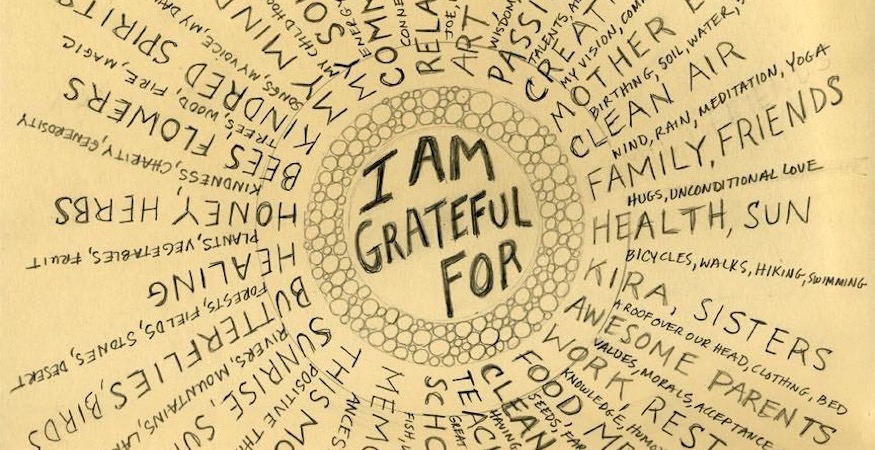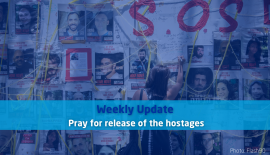Here To Stay
As the final winter rains came to an end giving way for a spectacular and especially blossoming spring, many Israelis took advantage of the first clear-skied Shabbat for weeks. They took time to spend outdoors and pretend that for 24 hours – if it lasts – the war can take a break.
My sleepy little hometown of Zichron Yakov, known for its pioneering history, pedestrian art fair and European cafes, was brimming with people that weekend. But things weren’t quite business as usual.
In front of each cafe and lining the length of the entire pedestrian art fair, were over 130 plastic chairs. They have been there since late October. On each chair is a poster of one of our hostages. Exhibits like this are seen all over the land. There are banners on lamp posts and hanging from bridges, photos are held up by crowds standing at junctions, they are pinned to traffic lights, and set up in offices and outside of schools. It’s difficult to go anywhere without seeing photos of our hostages.
Yet that weekend, as I strolled towards the art fair with a few friends, we had not even reached those chairs, when suddenly the teenager daughter stood dead in her tracks. Her face frozen in fear she stared up at the sky.
We craned our necks to see what was troubling her. A few meters above the eucalyptus trees that line the avenue, were colorful canopies of six para-gliders. It was a display of fun to lift the spirits of the people. But as the child stared, a handful of people who had stopped to see what was wrong, also looked up at the sky. For a few moments, they also had that same look of terror wash over their face.
“Images of terrorists on para-gliders dropping into the Nova music festival on October 7th are one of the “iconic” images engraved in the visual memory of us all, as a visual aid, a trigger to trauma”
The unforgettable images of terrorists on para-gliders dropping into the Nova music festival on October 7th are one of the “iconic” images of this war. It is engraved in the visual memory of us all. It serves as a visual aid, a trigger to trauma. Nearly six months into the war, the para-gliders having fun in Zichron Yakov, were for a few brief moments a harbinger of another savage attack on the Jewish people.
Trauma cuts deep. In an anxiety-ridden state, normal situations are perceived as potential threats. What is true on the personal level is also true on the collective. In a trauma-free world, a glider is a glider, but in a traumatized nation, the paraglider is a trigger.
The same goes for several things nowadays. The sound of a motor bike in the distance is often mistaken for a blood-curdling siren. I have a friend who spray painted his white Toyota pick-up truck blue, after he stopped to ask a nice young couple for directions and they immediately ran away, screaming that there is a terrorist in the car. The Toyota pick-up is an image of the war. These were the same trucks used notoriously by Palestinian UNRWA workers to drag off women to Gaza. Dead or alive, the women were bundled into the back of the truck, with the blood stains on their pants in view for all to see.
“There is nothing more isolating than trauma. Trauma makes the individual feel very, very alone”
To claim that the entirety of the Israeli people is traumatized, would not be an exaggeration. It is not necessary to be a direct survivor of the bloody pogrom to be acting out of trauma. Trauma is everywhere. The families of the hostages are traumatized, relatives of the few hostages who were returned are traumatized too. Helpless, they report that their loved ones are a mere shadow of themselves. More than anything – and speaking from personal experience – there is nothing more isolating than trauma. Trauma makes the individual feel very, very alone.
Over 20,000 soldiers have been injured in one way or another. There have been hundreds of amputations. Many have had heard nothing but gunfire and explosions for nearly 6 months. Parents, siblings or spouses of our military heroes are suffering sleepless nights. Even hearing a knock at the door is traumatic. Notices are pinned to doors asking people to knock in a certain way, so the person inside can distinguish that knock from that of future military personnel who arrive to bring news of the death of a son.
Days after the war broke out, two first-responders committed suicide, another dropped dead at only 35 years old. These horrors are just the tip of the iceberg as to how deep the trauma is.
Never before has there been such a demand for tranquilizers and sleeping pills. Therapists have waiting lists, there is a chronic lack of psychiatrists, psychologists, and social workers, and even a new trauma department in a Tel Aviv hospital specifically opened because of the war, is unable to meet the increasing demand. Crammed into hotel rooms, couples are breaking up, and their carefree off-spring are now considered as youth at risk. With vast strips of land now evacuated because of rocket fire, living space in Israel is getting smaller and smaller. The hotels and towns are full of evacuees and many cities and roads are out of bounds. This is a spacial trauma, stretching back to World War Two. It’s what the ghettos were all about. The loss of our land (however temporary) strikes this painful chord in history.
According to a survey carried out by a medical journal, the increase in Post-Traumatic Stress Disorder is not just because of what happened, but because of fears it could happen again.
“Since 1948 Jewish people have felt a safety denied them for 2,000 years. October 7th shattered that”
Ever since the rebirth of our state nearly 76 years ago, Jewish people have felt a safety denied them for 2,000 years. October 7th shattered that. People fear it could happen again. The failure of both the political and military systems to protect civilians has dug deep: but probably not as deep as the tunnels being dug by Hizbollah in the north, and Arabs in Judea and Samaria – and all, as you’re reading this. One terrified resident living a stone’s throw from the coastal city of Netanya, recorded the sounds of drilling under his house at night. It was one of the most played interviews on national radio. Grief and shock are about what happened. Fear and trauma are about it happening again.
Our national and collective anxiety is certainly not helped by some so-called pro-Israel governments speaking from both sides of their mouths. Bewilderingly, those very same nations who once projected the Israeli flag on national buildings immediately after the war broke out, now voted for an immediate Gaza cease-fire without making it contingent upon the release of the hostages. Minutes after the vote, they declared their meaningless statements. ”In these dark hours my country stands by the people of Israel,” blah blah blah.
Britain, who historically created the mess in the Middle East causing thousands to die, gave their usual cowardly lip service. The USA flexed their political muscle to show Israel that it is they who are boss. Threatening to cut arms to Israel, days later they too meaninglessly spouted “Israel has the right to defend itself against the terror of Hamas.”
The moral abdication of the world which still has historic Jewish blood on their hands, are content to have the blood of October 7th added to that. Never before have cries for a 2-State solution been so vigorous. In these times, Israelis know that a 2-State Solution is closer to the Final Solution more than to a political compromise. Given that these civilized democracies are perfectly fine with rewarding savages with a land of their own, is nothing short of mind-boggling.
The hostages are as good as dead for the world. Instead it’s all about looking morally virtuous by siding with the thousands of dead or starving Gazans – miraculously all of whom are women children and old people, all virtuous virgins probably too: and obviously not a terrorist in sight.
In a March 2024 edition of the Economist, the text on the front cover glared at the reader. “Israel Alone” The type hung above a frayed Israeli flag. Not that this magazine has ever been pro-Israel, but there is something to it. Israel is alone. Israel has always been alone. The Economist is right.
Yes, we have extremely loyal friends – such as anyone reading this, and this is a friendship which is appreciated, essential, cherished and hopefully nurtured. But in the grand scheme of things, the Jewish people have always stood alone.
Thousands of years ago, Balaam, a non-Jewish prophet, proclaimed that Israel is a people that dwells alone, a people who shall not be reckoned among the nations. Time has proved him right with this latest attempt of genocide of the Jewish people. Out of the 193 members of the United Nations, Israel is the only nation whose very right to exist is under a constant political rocket barrage. That’s nothing new. For more than 3,000 years, wherever we have lived, we have sooner or later been shunned, ghettoized, dispossessed, expelled and exterminated. Every other nation on this earth belongs to a larger block of countries with which it shares an ethnic history, religion or linguistic bond. Israel doesn’t share any of these things. For good and for bad, we are alone.
Yet in this aloneness, the Jews are the only people in the history of the world, to return to the same land after 2,000 years. We have outlived conquests, revived a language, made the desert bloom and although there are still not so many Jewish people in the world as there were before the Holocaust, we are thriving again.
An honest historical look at the against-all-odds survival of the Jewish people is enough to make many an atheist bend the knee.
“Watching these depressing events unfold, serve as a reminder that it is Israel who is His people”
In all our real and imagined sense of trauma and loneliness, this is the time to stop looking around for support, and cast our eyes upwards. We can also sit back and sooner or later see history repeat itself as the world leaders and nations who spurn Israel will sooner or later meet their end.
Watching these depressing events unfold, although difficult, serve as a reminder that it is Israel who is His people, and that our covenant is with the One who brought us out of Egypt with a mighty and outstretched arm. Israel will be here long after the United Nations, The Economist and politicians who think they are God: And for this, we are thankful.





